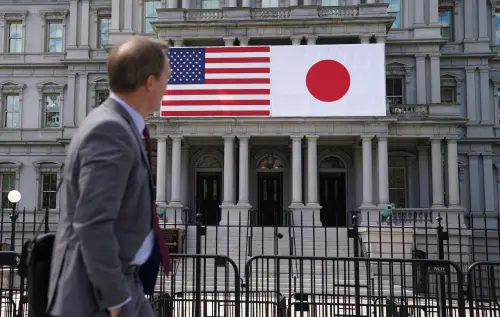When South Korean President Roh Moo Hyun visits Washington this week, what can he and President Bush possibly talk about?
The two presidents come into the discussion with opposite instincts.
Mr. Bush feels that North Korea is engaged in a pitiful, dangerous and unacceptable game of blackmail and doesn’t want to play. He insists that any future negotiations be multilateral, whether North Korea likes it or not, and that they proceed only after North Korea ceases its unacceptable nuclear activity.
Mr. Roh, by contrast, argues that as bad as North Korea is, the engagement strategy of the 1990s succeeded in capping its nuclear program and gradually drawing its leaders out of their shell. He wants to continue the diplomatic effort even in the face of provocations from Pyongyang and even if it fails to comply initially with U.S. denuclearization demands.
There is another way.
Negotiate without preconditions and without excessive concern about who else participates. But negotiate from a position of strength and resolve, Reagan-style. We should offer North Korea substantial incentives, well beyond what has been provided or discussed to date, to end dangerous weapons programs and begin to reform its economy and way of governance. But we should also insist that any increase in outside aid will require compliance with a much broader set of demands than we have made so far.
In other words, Washington and Seoul should propose a “grand bargain” that the United States and its regional security partners should pursue with North Korea. Although accords could be negotiated and implemented step by step, they would be guided by a clearly articulated and broad vision. That vision should help grab the attention and focus the imagination of North Korean leaders, who would be presented with a clear alternative to their present dangerous and self-destructive path.
We have used broad visions or road maps for Mideast, Balkans, Northern Irish and other regional peace talks. Sometimes they work. Why not try the same thing in Northeast Asia?
If this approach failed, the Bush administration would be much better prepared than it is now to argue to South Korea, Japan and China that a harder-line policy was needed. But there is also very good reason, based on the history of negotiations with North Korea, to think an ambitious plan could succeed. North Korea has concluded even unpalatable deals in the past when it thought it was getting enough in return, and it has indicated an awareness that it must reform its economy for years even if it has failed miserably in the attempt to do so.
The agenda would, of course, address the acute nuclear weapons issue as well as North Korea’s ballistic missiles. North Korea would have to stop its nuclear activities immediately and fully denuclearize. Moreover, it could no longer expect to obtain new nuclear reactors to replace those we negotiated away in 1994. Conventional power will have to do.
But the broad plan would go much further than the nuclear question. Consistent with Mr. Bush’s instincts that any deal with North Korea’s current government is unappealing and unpromising, it would seek to begin to change the basic nature of that regime.
One aspect of the broader plan would emphasize human rights issues such as the return of Japanese kidnapped by North Korea decades ago and even the internal practices of the North Korean regime toward its people. And of course Washington would offer a nonaggression pledge, peace treaty and diplomatic relations as well, provided North Korea agrees to the rest of the package.
But the plan’s centerpiece would be a combination of deep conventional arms reductions on the peninsula and assistance to North Korea to help it reform its economy. China, which has navigated the road from a communist command system to an entrepreneurial economy, would provide guidance and advice. China, Japan, South Korea and the United States would provide aid. Mr. Bush talked about such ideas early in his presidency but never fleshed them out. It is time we do so.
Only such a policy could reduce the enormous economic burden that North Korea’s oversized military places on the country. Without such weapons cuts and economic reform, North Korea will probably continue to provoke future crises in order to extort resources from the international community simply because its leaders will see no other way to stay financially afloat.
Recent ideas for dealing with the North Korean problem, such as accepting its nuclear program but then trying to block any plutonium exports, are unpromising. We need to end North Korea’s nuclear program, not talk around it. But focusing directly on it allows Pyongyang to set the agenda and also seems unlikely to work. We need a much bigger idea, and we need it now.


Commentary
Op-edWe Need To Make North Korea a Big Deal
May 13, 2003